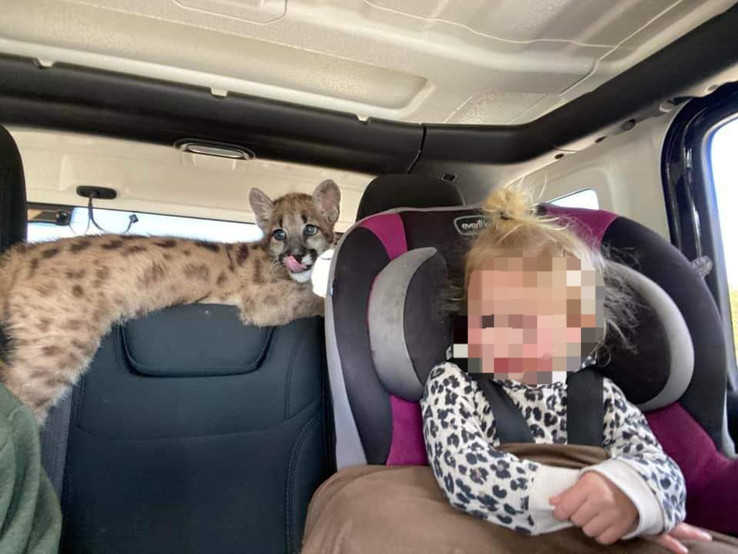Cicchelli Second Chance Rescue and Exotics cited with 18 violations at January inspection
- Roadside Zoo News

- Mar 3, 2022
- 5 min read

Key takeaways:
Cicchelli Second Chance Rescue lied to USDA inspectors and hid a cougar from them.
Cicchelli Second Chance Rescue was keeping a cougar in the owners’ home with no enclosure except a small dog crate in a furnace room surrounded by junk.
Cicchelli Second Chance Rescue lied to USDA inspectors about their acquisition of an otter.
Numerous animals at Cicchelli Second Chance Rescue were found to be in freezing conditions including an olive baboon, two rhesus macaques and five kinkajous.
A zebra was found with no access to water at Cicchelli Second Chance Rescue and when provided with water the zebra drank for 90 seconds.
Cicchelli Second Chance Rescue is providing inadequate diets with insufficient calcium to their wildcats.
Ryan and April Cicchelli lack adequate experience and knowledge of the species of animals that they own.
An olive baboon at Cicchelli Second Chance Rescue had 13 growths on its head but the animal had not received veterinary attention.
22 animals at Cicchelli Second Chance Rescue were housed in barns with no lights, preventing thorough examination of the animals or their enclosures.
Cicchelli Second Chance Rescue houses endangered ring-tailed lemurs in an unsafe dog kennel on concrete floors in a garage infested with mice.
Cicchelli Second Chance Rescue and Exotics in Lake City, Michigan, has been cited with 18 federal violations based on a January 26, 2022, U.S. Department of Agriculture inspection.
Cicchelli Second Chance Rescue and Exotics is a roadside zoo owned by Ryan and April Cicchelli. The pair was cited with a critical violation at the January inspection for repeatedly interfering with the inspection by providing false information to Animal and Plant Health Inspection Service (APHIS) inspectors. The USDA report indicates that the facility failed to keep records for a cougar, a North American river otter and an African crested porcupine that they had obtained.

The Cicchellis repeatedly denied that they had purchased a North American river otter, even after the USDA inspector provided a health certificate from Michigan, disposition records from the seller signed by April, and screenshots of Facebook messages between the seller and April.
The pair attempted to hide their newly acquired cougar cub from inspectors. On multiple occasions during the inspection the Cicchellis told the inspector that all of their animals had been inspected. However, the USDA inspector had evidence that the Cicchellis had recently obtained a cougar cub.
“It was only after inspectors stated they were in possession of a health certificate, provided by the state of Michigan, demonstrating the applicant was in possession of a cougar cub, the applicant admitted to having the cougar cub in her home,” according to the report.
April Cicchelli told inspectors that they had no enclosure for the cougar and it was allowed to roam the house during the day. At night the cougar was locked in a small wire dog crate in a furnace room, according to the inspection report. The crate contained a litter box that took up one-third of the floor space. The inspector noted that the furnace room was filled with junk including foam strips, paper, carpets, a nintendo controller and a trash bag, and the items were close enough that the cougar could reach through her crate and grab the items with her paw.
“There was evidence of chewed debris in and around the animal crate at the time of inspection,” according to the USDA report.
April showed the cougar to inspectors while it was on a leash and a harness and the inspector noted that the harness was loose and too big on the cougar and therefore it was not an appropriate method of controlling the animal if it misbehaved.
Cicchelli Second Chance Rescue has one cougar and two servals. When asked about her knowledge and experience with wildcats, April stated that she had spent four or five hours with an animal trainer associated with the person who the cougar was obtained from.

“Animals in possession by individuals that lack adequate experience and knowledge of that species is detrimental to the health and well-being of that species,” the inspector wrote in her report.
The inspector noted that April described one of the servals as “unfriendly” and “didn’t like people.” However, the inspector wrote that the serval’s enclosure had no den box, so the animal did not have the ability to hide or retreat from people. In addition, Cicchelli staff must enter the enclosure to clean it while the servals are unsecured inside. The dangerous setup could lead to human or animal injury, according to the USDA report.
The inspectors found that Cicchelli Second Chance Rescue was supplementing the diets for the cougar and servals with a seaweed calcium supplement and they were using inadequate amounts. The inspectors also found April was unable to tell them the amount of meat the animals were fed daily, and “the amounts changed numerous times when the applicants were asked about the diets.”
An olive baboon had at least 13 growths on its head; many more than were seen at previous inspections, according to the report. Despite the increase in growths, the Cicchellis had not consulted with a veterinarian to evaluate the animal’s condition.
22 animals were housed in barns with no lights, according to the report. The animals include one striped skunk, 8 cavies, two wallabies, four coatimundis, one red kangaroo, two servals, two cynomolgus monkeys, two brown lemurs and two vervets.
“The lack of light prevents thorough daily observations and adequate routine cleaning,” the inspector wrote in her report. “The applicant must light the facility well enough to permit routine inspection, cleaning of the facility, and observation of the animals.”
Numerous animals were found to be in freezing conditions. Inside the shelter building for the olive baboon the temperature reading was 31 degrees Fahrenheit. Inside the shelter building for the two rhesus macaques the temperature reading was 37.6 degrees Fahrenheit. The indoor temperature of the enclosure housing five kinkajous was only 45 degrees Fahrenheit.
“The ambient temperatures shall not be allowed to fall below or rise above temperatures compatible with the health and comfort of the animal,” the inspector wrote.
The inspector found that during winter two rhesus macaques and one olive baboon are housed in the shelter attached to the outdoor portion of their enclosure. The inspector found there was no lockout inside the heated shelter and as a result the primates are locked outside in the cold weather and temperature extremes while the enclosures are being cleaned. At the time of the inspection the temperature was 12.3 degrees Fahrenheit with a wind chill of 7.6 degrees Fahrenheit.
“Forcing the animals to stay outside during these events can lead to animal discomfort, suffering, freezing of fingers and toes, or other injuries,” the inspector wrote in her report.

Inspectors found there was a layer of ice on top of the water trough for the zebra, making potable water inaccessible.
“After the applicant broke the ice, the zebra drank rapidly for approximately 90 seconds,” the inspector noted.

Six ring-tailed lemurs were being housed in a garage and their enclosure was constructed of wire dog kennel panels. The panels had gaps that three of the ring-tailed lemurs were able to escape through and the lemurs were observed loose at the time of the inspection.
The inspector also noted that the floor of the garage was made of concrete that was not properly sealed which prevented thorough cleaning and sanitization and could lead to animal disease. On several occasions, the inspector witnessed a mouse running alongside the lemur enclosure.
Cicchelli Second Chance Rescue and Exotics was cited with a total of 12 non-critical violations, five critical violations and one direct violation.
The USDA ordered Cicchelli Second Chance Rescue to fix all of the outstanding violations and come into compliance within two more inspections, or by March 29, or their USDA license will be forfeited and they’ll have to wait six months to reapply. Cicchelli Second Chance Rescue and Exotics USDA exhibitor license is currently listed on the USDA website as active through October 12, 2024.
Download the full USDA report on Cicchelli Second Chance Rescue and Exotics:
%20(1).png)



















Comments